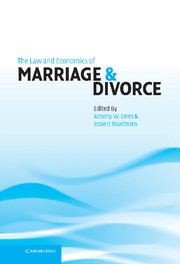Book contents
- Frontmatter
- Contents
- List of tables and figure
- List of contributors
- 1 Introduction
- 2 Marriage: the long-term contract
- 3 Marital commitment and the legal regulation of divorce
- 4 Mutual consent divorce
- 5 An economic approach to adultery law
- 6 Louisiana's covenant marriage law: recapturing the meaning of marriage for the sake of the children
- 7 Cohabitation and marriage
- 8 Marriage as a signal
- 9 For better or for worse? Is bargaining in marriage and divorce efficient?
- 10 Weak men and disorderly women: divorce and the division of labor
- 11 The impact of legal reforms on marriage and divorce
- 12 European divorce laws, divorce rates, and their consequences
- Index
- References
3 - Marital commitment and the legal regulation of divorce
Published online by Cambridge University Press: 13 August 2009
- Frontmatter
- Contents
- List of tables and figure
- List of contributors
- 1 Introduction
- 2 Marriage: the long-term contract
- 3 Marital commitment and the legal regulation of divorce
- 4 Mutual consent divorce
- 5 An economic approach to adultery law
- 6 Louisiana's covenant marriage law: recapturing the meaning of marriage for the sake of the children
- 7 Cohabitation and marriage
- 8 Marriage as a signal
- 9 For better or for worse? Is bargaining in marriage and divorce efficient?
- 10 Weak men and disorderly women: divorce and the division of labor
- 11 The impact of legal reforms on marriage and divorce
- 12 European divorce laws, divorce rates, and their consequences
- Index
- References
Summary
The question of the appropriate role of law in regulating marriage and divorce is the subject of much controversy in the United States – a raging battle of the “Culture Wars” (Hunter, 1991). On one side are social conservatives, who view divorce and family instability as an important source of societal decline. These advocates of “family values” adopt a somewhat punitive tone, arguing that the family can be saved only if the government restricts divorce, by reinstituting fault grounds and discouraging unhappy spouses from selfishly defecting from their responsibilities. Liberals tend to oppose all restrictions on divorce, partly on the ground that they will not be effective in promoting family stability or enhancing the welfare of children. More importantly perhaps, liberals challenge what they view as oppressive constraints on individual freedom.
Recently, conservatives have been encouraged by the introduction of covenant marriage statutes in a few US states. These laws allow couples to choose a marriage option that involves a legal commitment more binding than is allowed under conventional no-fault divorce law. Some proponents of covenant marriage are hopeful that it is part of a trend toward more restrictive divorce reforms – a return to a regime in which divorce is conditioned on fault. Not surprisingly, many liberals view covenant marriage with alarm – for the same reason that conservatives favor these laws.
- Type
- Chapter
- Information
- The Law and Economics of Marriage and Divorce , pp. 35 - 56Publisher: Cambridge University PressPrint publication year: 2002
References
- 6
- Cited by



